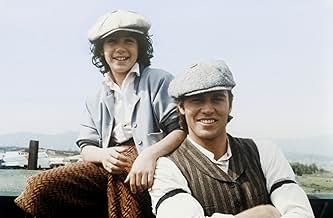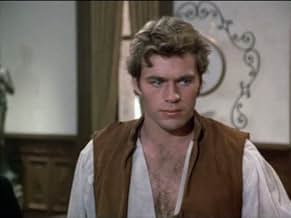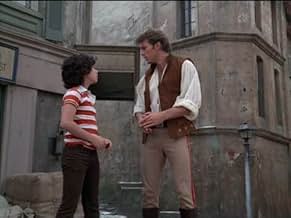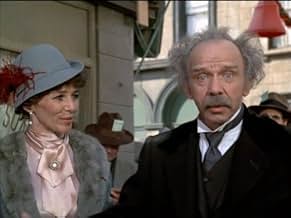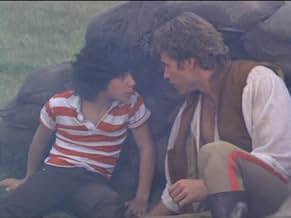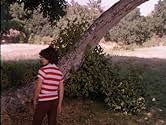NOTE IMDb
8,0/10
1,8 k
MA NOTE
Les voyageurs du temps se déplacent dans le temps pour réparer les erreurs de l'histoire.Les voyageurs du temps se déplacent dans le temps pour réparer les erreurs de l'histoire.Les voyageurs du temps se déplacent dans le temps pour réparer les erreurs de l'histoire.
- Récompenses
- 1 nomination au total
Parcourir les épisodes
Histoire
Le saviez-vous
- AnecdotesAfter leaving his acting career behind, Meeno Peluce became a high school history teacher.
- GaffesIn the early episodes, whenever the Voyagers are in time jump, neither their clothes nor number of personnel match when they jumped or land.
- Citations
[opening narration]
Phineas Bogg: We travel through time to help history along, give it a push where it's needed. When the Omni's red, it means history's wrong. Our job's to get everything back on track.
- Crédits fousDuring the credits, we hear Meeno Peluce, one of the cast members, say, "If you would like to learn more about [names of three famous things pertaining to the episode], take a voyage down to your public library. It's all in books."
- ConnexionsEdited from Les boucaniers (1958)
Commentaire à la une
There are several things to note about "Voyagers!" The first is that this was a part of a master plan by NBC Program chief Brandon Tartikoff to merge entertainment with education, and to provide kids with intelligent programming, not the usual dreck that seemed so prevalent in the 1980s.
The concept of the show was deceptively simple. There are a team of men and women who keep track of "history." These "voyagers" each have a hand-held device called an "Omni" which gives them their location, the date and a signal if history is "wrong." They all go back and forward through time to correct any "mistakes" that may have occurred in time and keep the world on track.
One voyager is named Phineas Bogg (an obvious play on Jules Verne's Phileas Fogg from "Around The World In 80 Days"). However this particular voyager didn't pass his history exam and landed on the windowsill of Jeffrey, who just happened to be a whiz kid in history. Together, they became "Voyagers!"
The serious problem the program had was in its construction. In one episode, Germany had somehow won World War I. The voyagers traveled back in time and discovered that famed flying ace Eddie Rickenbacher had nothing to do. That's because the Wright Brothers hadn't invented the airplane. So they had to travel again and discovered Orville and Wilbur were arguing over a girl in their bicycle shop instead of working on their flying machine. So the Voyagers had to set them back on track.
It had to have been extremely difficult to write such elaborate plots that both were well known enough for an audience to relate to and yet capable of making sense in the plot of the show. As brilliant as some of these episodes were, the question is how many related subplots could there be for any moment in history, before you get into material that isn't in the library? With such a limitation, with production costs being what they were for an early 1980s s/f program and with ratings being lower than desired, "Voyagers!" was not viable for more than a year. Looking at the series now, it would have made for a brilliant "Harry Potter" style string of films, since there really aren't enough historic events to have made it to the famed 100 episode level.
The concept of the show was deceptively simple. There are a team of men and women who keep track of "history." These "voyagers" each have a hand-held device called an "Omni" which gives them their location, the date and a signal if history is "wrong." They all go back and forward through time to correct any "mistakes" that may have occurred in time and keep the world on track.
One voyager is named Phineas Bogg (an obvious play on Jules Verne's Phileas Fogg from "Around The World In 80 Days"). However this particular voyager didn't pass his history exam and landed on the windowsill of Jeffrey, who just happened to be a whiz kid in history. Together, they became "Voyagers!"
The serious problem the program had was in its construction. In one episode, Germany had somehow won World War I. The voyagers traveled back in time and discovered that famed flying ace Eddie Rickenbacher had nothing to do. That's because the Wright Brothers hadn't invented the airplane. So they had to travel again and discovered Orville and Wilbur were arguing over a girl in their bicycle shop instead of working on their flying machine. So the Voyagers had to set them back on track.
It had to have been extremely difficult to write such elaborate plots that both were well known enough for an audience to relate to and yet capable of making sense in the plot of the show. As brilliant as some of these episodes were, the question is how many related subplots could there be for any moment in history, before you get into material that isn't in the library? With such a limitation, with production costs being what they were for an early 1980s s/f program and with ratings being lower than desired, "Voyagers!" was not viable for more than a year. Looking at the series now, it would have made for a brilliant "Harry Potter" style string of films, since there really aren't enough historic events to have made it to the famed 100 episode level.
Meilleurs choix
Connectez-vous pour évaluer et suivre la liste de favoris afin de recevoir des recommandations personnalisées
- How many seasons does Voyagers! have?Alimenté par Alexa
Détails
- Durée1 heure
- Mixage
- Rapport de forme
- 1.33 : 1
Contribuer à cette page
Suggérer une modification ou ajouter du contenu manquant

Lacune principale
What is the Hindi language plot outline for Voyages au bout du temps (1982)?
Répondre
